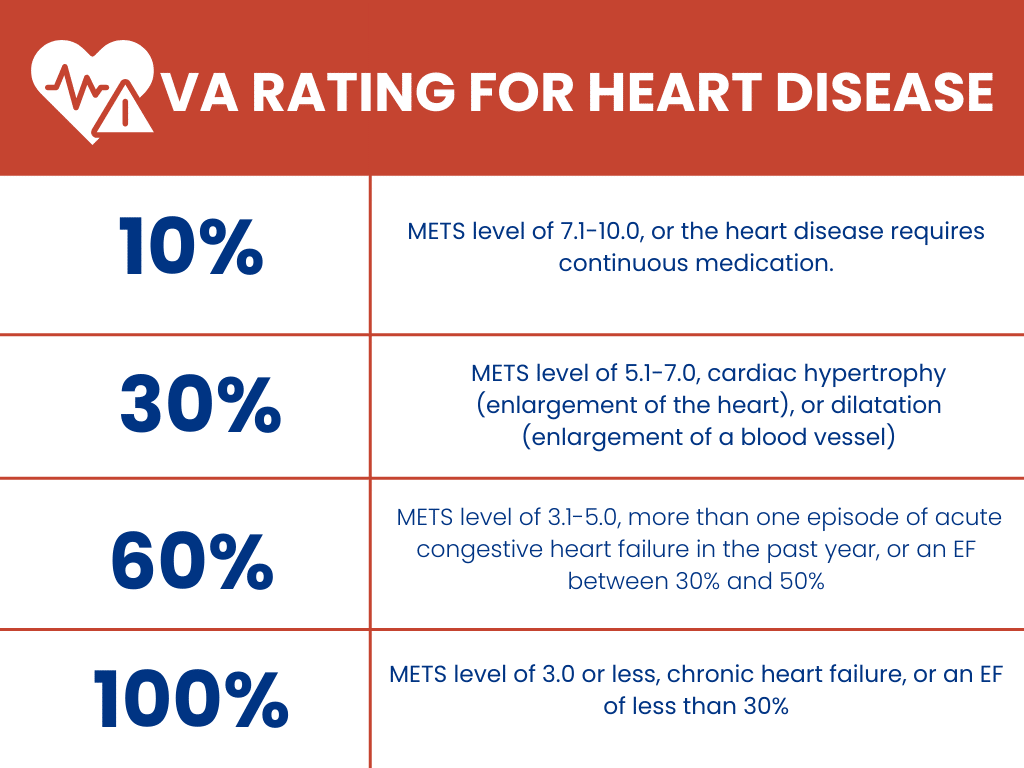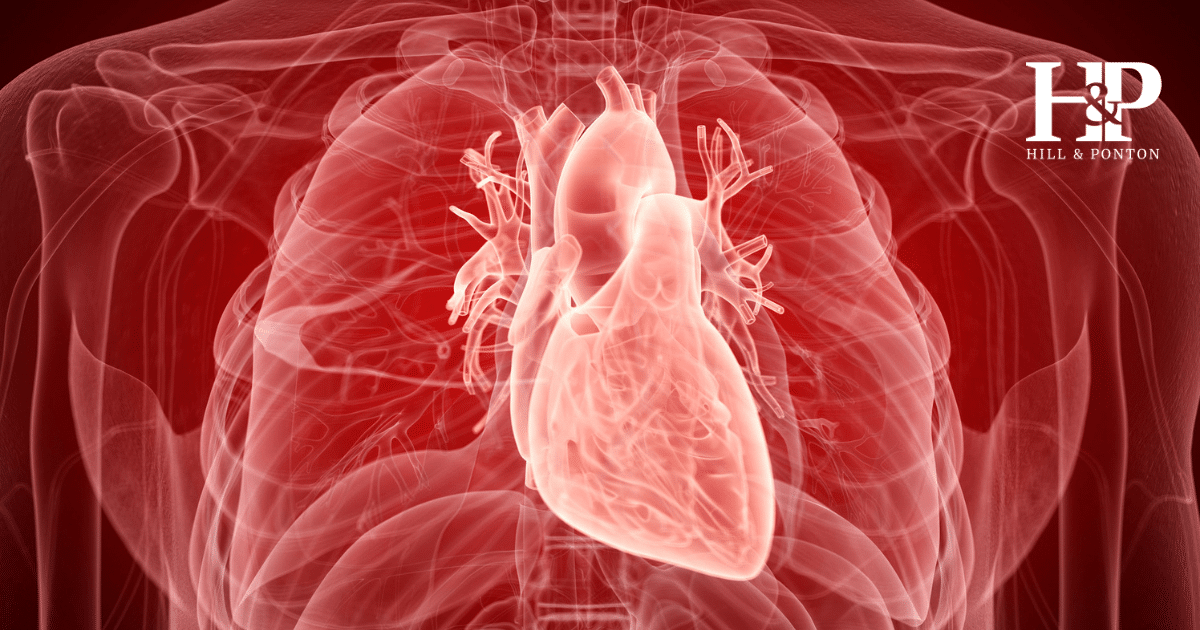Heart disease can significantly impact the quality of life for veterans. The VA recognizes a wide range of heart conditions as eligible for disability benefits. Veterans suffering from these or any other heart-related issues that may be connected to their service are encouraged to explore their options for compensation.
It’s important to note that even if your specific condition isn’t listed below, the VA may still provide benefits if it can be service-connected.
The Most Common Heart Conditions Recognized by the VA
Coronary Artery Disease (CAD)
Coronary artery disease, also known as ischemic heart disease, is one of the most common heart conditions affecting veterans. It involves the narrowing or blockage of coronary arteries due to plaque buildup, leading to symptoms such as chest pain, shortness of breath, and fatigue. See CAD ratings.
Hypertension
Hypertension, or high blood pressure, is frequently seen among veterans and can lead to serious complications such as heart attack, stroke, and kidney disease. The VA rates hypertension based on the severity and frequency of elevated blood pressure readings. See the VA ratings for hypertension.
Heart Arrhythmia
Heart Arrhythmia is an irregular and often rapid heart rate that increases the risk of stroke, heart failure, and other complications. Some types of irregular heart rhythm conditions include Tachycardia , Bradycardia and Sick Sinus Syndrome. Veterans with this condition may qualify for disability benefits depending on the severity and impact on their daily lives. This could include the placement of a pacemaker if necessary. See the ratings for heart arrhythmia.
Heart Murmur
Heart murmurs vary in severity, with some being harmless and others indicative of serious heart conditions. Veterans experiencing significant symptoms or complications may be eligible for disability benefits.
Cardiomyopathy
Cardiomyopathy refers to diseases of the heart muscle that make it harder for the heart to pump blood effectively. This condition can lead to heart failure and may qualify for VA disability benefits.
Aortic Stenosis
Aortic stenosis, a condition where the aortic valve narrows, reduces blood flow from the heart to the rest of the body and often requires valve replacement surgery. Veterans with aortic stenosis can receive disability benefits based on the severity and impact on their health.
Congestive Heart Failure
Congestive heart failure occurs when the heart is unable to pump sufficient blood to meet the body’s needs, leading to symptoms like fatigue, shortness of breath, and fluid buildup in the legs and lungs. Veterans with congestive heart failure may qualify for higher VA disability ratings based on symptom severity.
Heart Surgery
Veterans who have undergone heart surgery, such as valve replacements or bypass surgery, may receive temporary 100% disability ratings during their recovery period.
In addition to the conditions listed above, here’s some additional conditions the VA commonly recognizes.
- Angina: Chest pain caused by reduced blood flow to the heart.
- Arteriosclerosis: Hardening of the arteries that can lead to various heart conditions.
- Endocarditis: Infection of the heart’s inner lining.
- Myocarditis: Inflammation of the heart muscle.
- Pericarditis: Inflammation of the sac surrounding the heart.
- Valvular Heart Disease: Conditions affecting the heart valves, such as mitral valve prolapse or aortic insufficiency.
- Ventricular Arrhythmias: Severe irregular heart rhythms originating from the ventricles.
It is important for veterans to seek evaluation and potentially file for VA disability benefits if they experience any heart condition related to their service, even if it’s not commonly listed. The VA may provide compensation for a wide range of heart-related conditions that can be connected to military service.
VA Presumptive Heart Conditions
Certain conditions are presumed by the VA to be service-connected, making it easier for veterans to qualify for disability benefits. Presumptive heart conditions include:
- Ischemic heart disease
- Hypertension
- Heart murmurs
- Cardiomyopathy
- Aortic stenosis
How VA Rates Heart Disease
VA rates heart disease based on the severity of the condition and its impact on a veteran’s ability to work and perform daily activities. These ratings, which range from 0% to 100%, are primarily determined by the level of exertion, measured in METs (Metabolic Equivalent of Task), that causes symptoms like shortness of breath, fatigue, chest pain, dizziness, or fainting. The lower the METs level at which symptoms occur, the higher the disability rating.

100% Rating:
- Conditions: This rating is assigned for consistent congestive heart failure, or when a veteran has a METs score of 3 or less, accompanied by symptoms such as shortness of breath, fatigue, chest pain, dizziness, or fainting.
- Examples: Activities that might trigger symptoms at this level include slow walking for one block, dressing, or light activities of daily living. Additionally, left ventricular dysfunction with an ejection fraction of less than 30% also qualifies for this rating.
60% Rating:
- Conditions: Veterans who experience two or more episodes of congestive heart failure within the past year, or who have a METs score of 4 or 5, fall under this category. Symptoms include shortness of breath, fatigue, chest pain, dizziness, or fainting.
- Examples: Veterans might experience symptoms with moderate activities, such as walking briskly for a short distance, climbing a flight of stairs slowly, or raking leaves. Left ventricular dysfunction with an ejection fraction between 30% and 50% also warrants a 60% rating.
30% Rating:
- Conditions: A METs score of 6 or 7 is associated with this rating, with symptoms like shortness of breath, fatigue, chest pain, dizziness, or fainting.
- Examples: Symptoms might occur during less strenuous activities such as walking on level ground at a moderate pace, mowing the lawn with a power mower, or cycling at a leisurely pace. Additionally, evidence of heart hypertrophy or dilation on an x-ray or electrocardiogram supports a 30% rating.
10% Rating:
- Conditions: Veterans who have a METs score of 8, 9, or 10, and experience symptoms such as shortness of breath, fatigue, chest pain, dizziness, or fainting, fall into this category.
- Examples: At this level, symptoms might appear during more strenuous activities like jogging, playing doubles tennis, or running. Veterans who require continuous medication for their heart condition also receive a 10% rating.
The METs level is a crucial factor in determining your VA rating for heart disease, as it directly reflects the severity of your condition and how it limits your ability to perform everyday activities. Understanding how your METs score corresponds to your daily functional capacity can help you better navigate the VA disability claims process.
How to Get a 100% VA Rating for Your Heart Condition
A 100% VA rating for heart disease is given to veterans with severe heart conditions that completely incapacitate them or significantly limit their ability to perform daily activities. Conditions that may qualify include severe congestive heart failure or cases requiring heart transplants.
Watch our video guide on securing a 100% heart disease rating, with VA attorney Rachel Cheek:
Our disability lawyers have won 100% VA disability and TDIU benefits for thousands of veterans. Get a free evaluation of your case today to see how we can help you.
Free case evaluationTotal Disability Individual Unemployability (TDIU)
Veterans unable to maintain substantially gainful employment due to their heart condition may qualify for TDIU, which provides compensation at the 100% disability rate even if their schedular rating is less than 100%.
Applying for TDIU involves submitting VA Form 21-8940 along with supporting evidence specific to heart disease. Types of evidence you might submit are listed below.
- Medical Evidence: Detailed medical records and statements from healthcare providers outlining the severity of the heart condition and its impact on the veteran’s ability to work.
- Employment History: Documentation of past employment and reasons for leaving jobs, demonstrating how the heart condition has affected the veteran’s work capacity.
- Personal Statements: Statements from the veteran and others providing insight into how the heart condition impacts daily life and employability.
How to Increase VA Ratings
Heart diseases in veterans are particularly important to discuss because oftentimes they can correlate with other conditions and impact each other. Some of these conditions include things like spinal cord injuries, diabetes and post-traumatic stress disorder (PTSD).
However, there are also two secondary conditions that relate to heart disease and can increase your VA disability rating should you file for them, too. These commonly occurring conditions are anxiety and mental health disorders (such as PTSD or GAD) and Obstructive Sleep Apnea.
Example of Securing a Higher Rating
A veteran initially rated at 30% for ischemic heart disease successfully appealed and secured a 60% disability rating. The appeal was based on medical evidence that demonstrated the severity of the condition, warranting a higher evaluation. Below are some of the contributing factors to the veteran receiving a higher VA rating for his condition.
Ejection Fraction Findings: The veteran’s January 2013 transthoracic echocardiogram and February 2013 left ventriculography revealed a left ventricular ejection fraction of 50%. This specific measurement met the criteria for a 60% disability rating under the VA’s diagnostic code for ischemic heart disease and was a large reason for the increased rating.
June 2010 Echocardiogram: A private echocardiogram performed on June 3, 2010, showed evidence of left ventricular hypertrophy and mild aortic dilatation. These additional findings provided additional justification for increasing the veteran’s disability benefits.
Disability Benefits Questionnaire (DBQ) and VA Exams: The veteran underwent a DBQ in June 2013 and a VA examination in February 2015, both of which reported MET levels between 3-5. While these levels indicated significant limitations, an April 2015 addendum noted that these limitations were largely due to other conditions, like COPD and peripheral vascular disease, rather than the heart disease alone.
Ultimately, the Board of Veterans’ Appeals decided to granted a 60% disability rating effective from June 3, 2010. The additional medical evidence, especially the results of the echocardiogram and ventriculography helped solidify the veterans case and got him the benefits that he needed. Receiving the right tests and showcasing the right information to the VA is incredibly important in helping take a low rating for benefits, to a higher one that they may desperately need.
Has VA Denied or Underrated You?
Navigating the VA disability appeals process for heart conditions can be complicated. Contact us for a free case evaluation and get the support you need to secure the benefits you deserve.
Maximize Your Benefits
Unhappy with your VA decision? We’re here to help. Contact us for a free review of your case.




